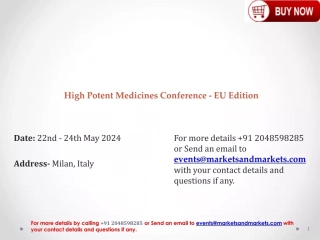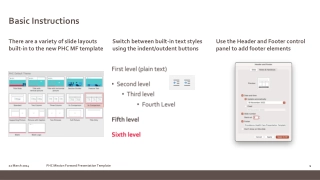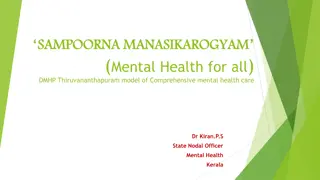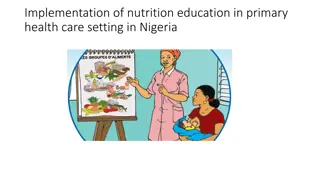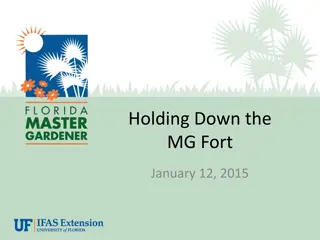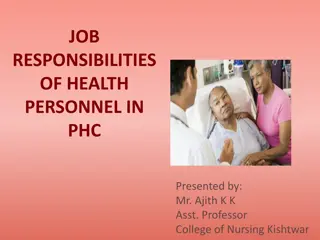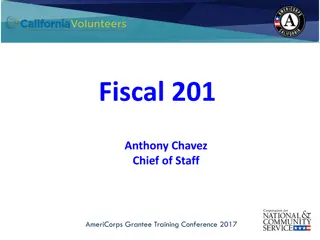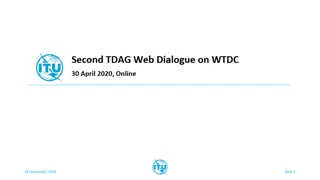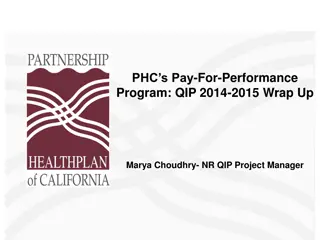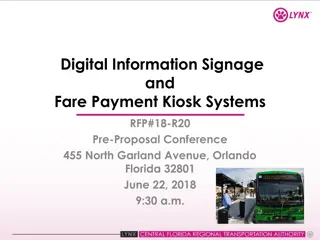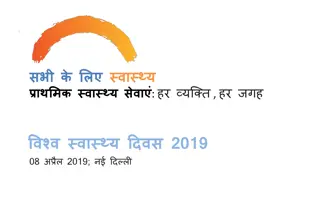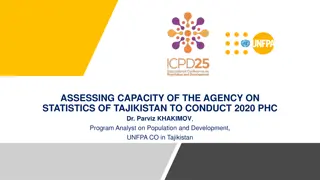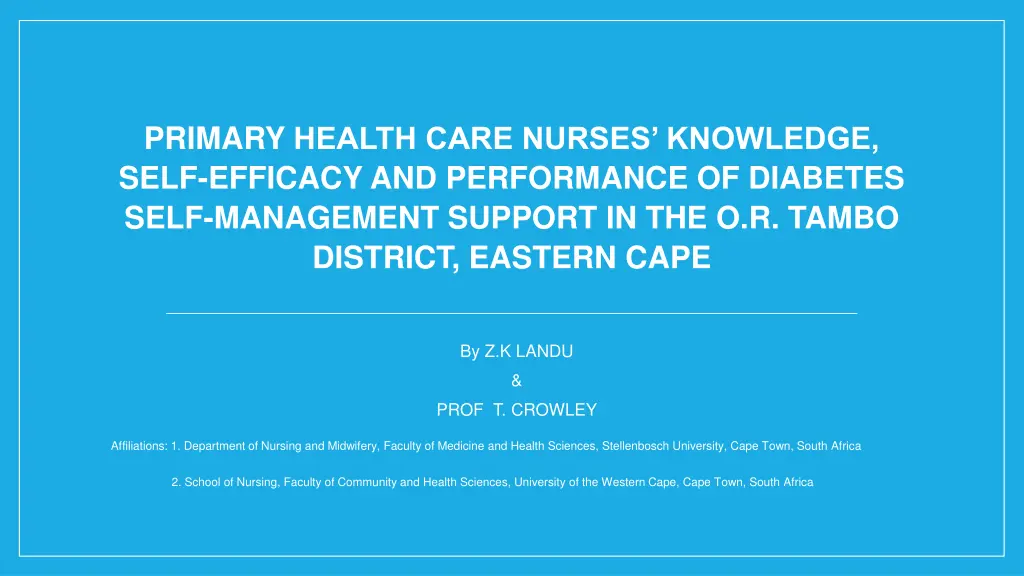
Nurses' Knowledge and Self-Efficacy in Diabetes Care
This study evaluates primary health care nurses' knowledge, self-efficacy, and performance in providing diabetes self-management support in the O.R. Tambo District, Eastern Cape. Findings show that most nurses scored well in diabetes knowledge, but there is room for improvement in self-efficacy. The research methodology involved a quantitative cross-sectional design, and the results provide insights into the nurses' capabilities in managing diabetes.
Download Presentation

Please find below an Image/Link to download the presentation.
The content on the website is provided AS IS for your information and personal use only. It may not be sold, licensed, or shared on other websites without obtaining consent from the author. If you encounter any issues during the download, it is possible that the publisher has removed the file from their server.
You are allowed to download the files provided on this website for personal or commercial use, subject to the condition that they are used lawfully. All files are the property of their respective owners.
The content on the website is provided AS IS for your information and personal use only. It may not be sold, licensed, or shared on other websites without obtaining consent from the author.
E N D
Presentation Transcript
PRIMARY HEALTH CARE NURSES KNOWLEDGE, SELF-EFFICACY AND PERFORMANCE OF DIABETES SELF-MANAGEMENT SUPPORT IN THE O.R. TAMBO DISTRICT, EASTERN CAPE By Z.K LANDU & PROF T. CROWLEY Affiliations: 1. Department of Nursing and Midwifery, Faculty of Medicine and Health Sciences, Stellenbosch University, Cape Town, South Africa 2. School of Nursing, Faculty of Community and Health Sciences, University of the Western Cape, Cape Town, South Africa
BACK GROUND Patients newly diagnosed with diabetes were estimated to be 4430 in OR Tambo District in 2018/19 and 1240 in King Sabatha Dalindyebo Sub-district2. Diabetes is one of the leading causes of mortality in South Africa2. Patients living with diabetes are primarily managed by professional nurses in primary health care (PHC) facilities2. Therefore, PHC nurses require knowledge of diabetes and confidence (self- efficacy) to perform diabetes self-management support.
STUDY AIM The aim of the study was to evaluate the diabetes knowledge, self-efficacy and performance of diabetes Self Management Support (SMS) by Primary Health Care nurses.
STUDY OBJECTIVES To assess the diabetes self-management knowledge of nurses. To determine nurses perceived capacity (self-efficacy) to perform diabetes self- management support and performance of self-management. To determine the association between nurses knowledge, self-efficacy, and the performance of diabetes self-management support.
RESEARCH METHODS A quantitative cross-sectional and simple correlational design was used. The study was conducted in 17 Primary health care clinics and 2 community health centres in King Sabata Dalindyebo sub-district in the O.R. Tambo District, Eastern Cape, between July and August 2021. Primary health care professional nurses were the study s target. An exhaustive sampling was used because of the relatively small population, leaving a total sample of 100 nurses. A Diabetes Basic Knowledge Test tool questionnaire, and the Self-efficacy and Performance in Self-Management Support (SEPSS) instrument.16 was used4,5. Ethics approval was obtained from Stellenbosch University, Eastern Cape Department of Health Ethics committee, and ORT District manager. Data was analysed using the Statistical Programme for the Social Sciences (SPSS) version 27.
RESULTS Diabetes knowledge All the participants had a knowledge score of > 50%. Out of 100 participants, 75 had a knowledge of more or equal to 75%. Only 64 of the participants had a knowledge score of more than or equal to 80%.
RESULTS Total Scores for Self-efficacy and Performance of SMS N Mean Std. Deviation Self-efficacy-Assess 100 3.06 0.7 Performance-Assess 100 2.81 0.8 Self-efficacy-Advise 100 3.16 0.6 Performance- Advise 100 2.98 0.6 Self-efficacy-Agree 100 3.05 0.7 Performance-Agree 100 2.92 0.7 Self-efficacy-Assist 100 3.33 0.6 Performance- Assist 100 3.18 0.6 Self-efficacy-Arrange 100 3.20 0.6 Performance-Arrange 100 2.99 0.8 Self-efficacy-Partnership 100 3.11 0.7 Performance-Partnership 100 2.93 0.7 Total self-efficacy 100 18.91 3.2 Total performance 100 17.81 3.3 Self-efficacy had a higher mean score of 18.91 (SD 3.2) than performance which had a mean of 17.8 (SD 3.3).
RESULTS Correlations between Knowledge, Self-management Support Self-efficacy and Performance Knowledge Score% Performance 1.0 Total self- efficacy Total Spearman's rho Knowledge score% -0.3 -0.1 Correlation Coefficient Sig. (2-tailed) N Correlation Coefficient Sig. (2-tailed) N Correlation Coefficient Sig. (2-tailed) N . 0.7 100 1.0 0.3 100 0.78** 100 0.03 Total self-efficacy 0.75 100 -0.1 . 0.0 100 1.0 100 0.78** Total performance 0.32 100 0.0 100 . 100 There were no significant relationship between the knowledge score and the total self- efficacy and performance scores. However, there was a strong positive relationship between the total self-efficacy and total performance score.
DISCUSSION, CONCLUSION AND RECOMMENDATIONS Primary health care nurses in KSD Sub-district, OR Tambo are knowledgeable about diabetes. This is evidenced by the fact that the majority of participants scored above 70%. This score is higher than studies conducted using the same tool4. However, their knowledge does not translate into self-efficacy and the performance of SMS in practice. Self-efficacy scores (mean 18.91, s.d. 3.2 out of 24) were higher than performance of SMS scores (mean 17.81, s.d. 3.3 out of 24). The high self-efficacy score shows that nurses are confident about diabetes self management, but they need specific Self-management support training, and support by experienced mentors, appropriate guidelines and comprehensive integrated chronic care systems.
For more information, please refer to the article; https://phcfm.org/index.php/phcfm/article/view/3713/6008 African Journal of Primary Health Care & Family Medicine ISSN: (Online) 2071-2936, (Print) 2071-2928
KEY REFERENCES 1. International Diabetes Federation. IDF diabetes atlas [homepage on the Internet]. 10th ed. Brussels; 2021 [cited 2022 Jun 26]. Available from: https:// diabetesatlas.org./atlas/tenth-edition/ 2. Eastern Cape Department of Health (ECHD). no date. Annual Performance Plan. 2020/2021. Bhisho: ECHD Eastern Cape Department of Health, OR Tambo District Health Plan 2018/2019 2020/2021. (no date). 3. Republic of South Africa. Integrated clinical services manual. Pretoria: Government printers; 2015. 3. 4. .Ledbetter RB. Diabetes understanding among staff nurses: Examining the actual versus perceived knowledge in the acute care setting [homepage on the Internet]. GardnerWebb University; 2011 [cited 2020 May 05]. Available from: https://digitalcommons. gardner- webb.edu/cgi/viewcontent.cgi?article=1160&context=nursing_etd 16. 5. Duprez V, Van Hooft SM, Dwaarswaard A, Van Staa A, Van Hecke A, Stratting MMH. The development and psychometric validation of the self-efficacy and performance in self-management support (SEPSS) Instrument. J Adv Nurs. 2016;72(6):1381 1391. https://doi.org/10.1111/jan.12918.

